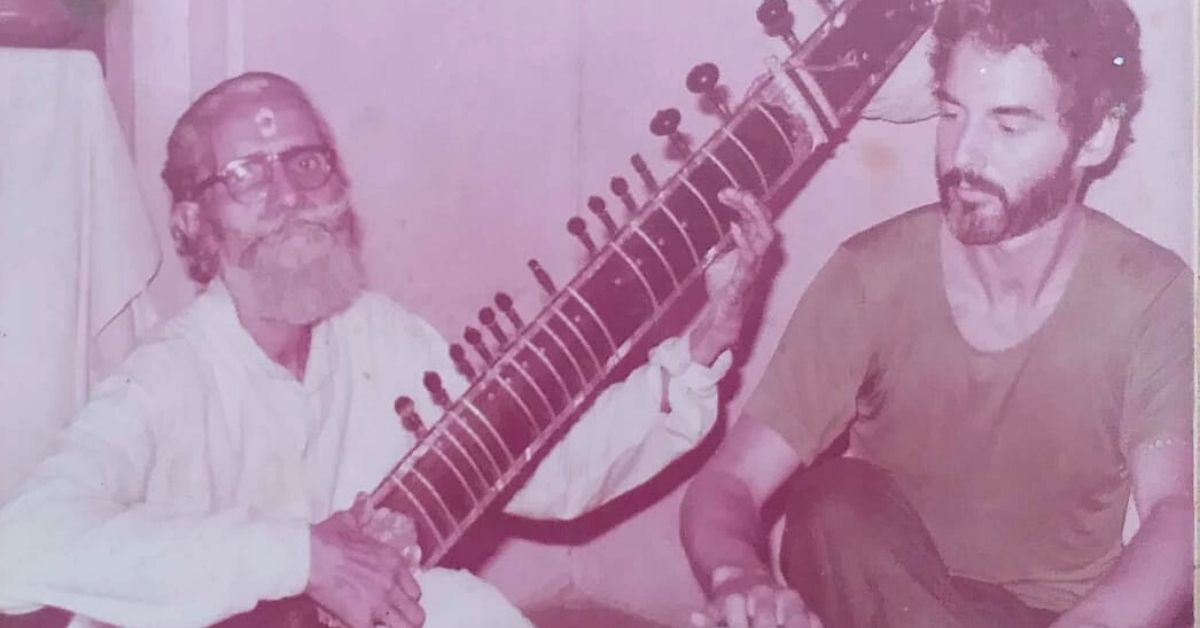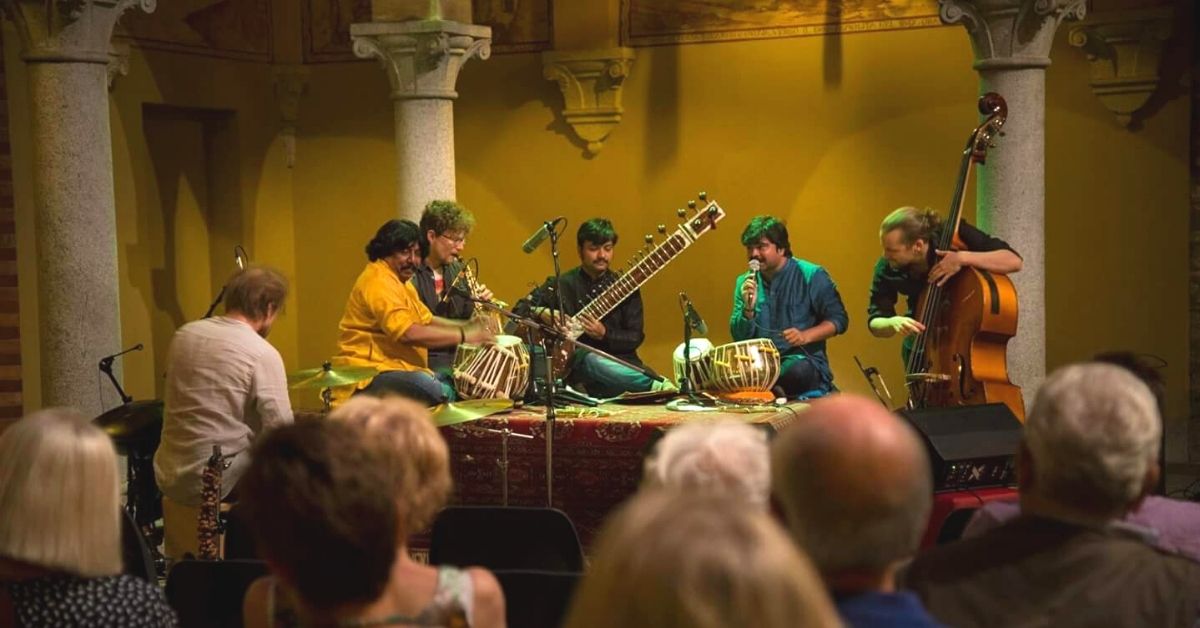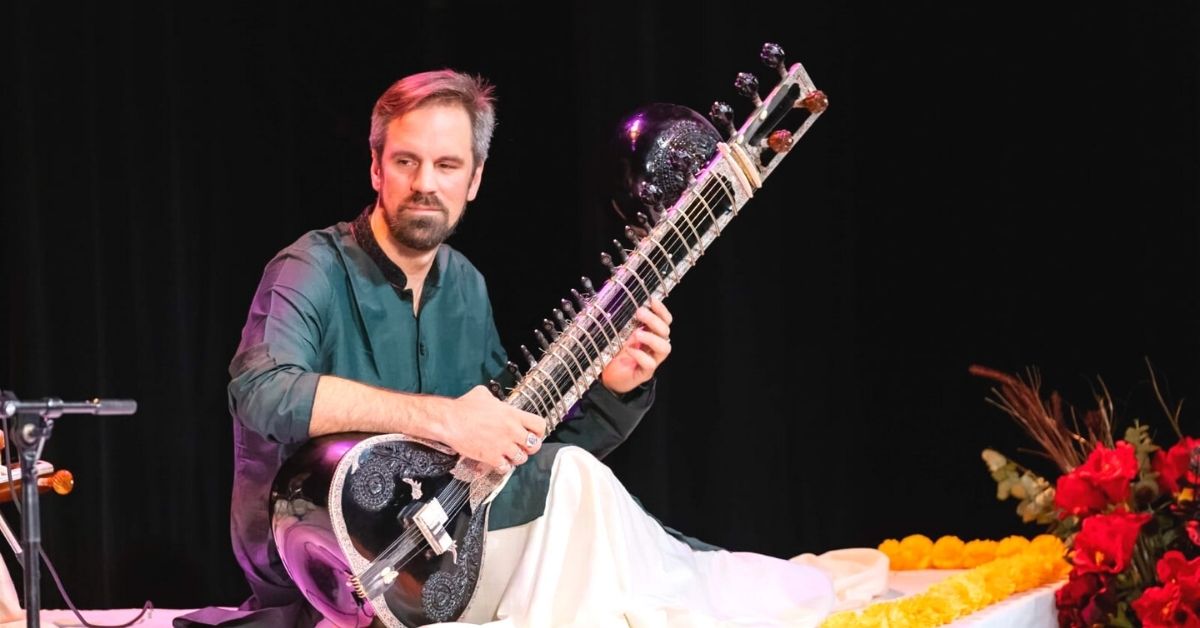Not too far from the ghat, sprawled along the River Ganga are the famous gullies and pedestrian alleys of Dashashwamedh area in Varanasi. No more than 6 feet wide, these ever tangling maze-like lanes are part of a heritage walk in one of the oldest cities of India. They have had immense influence from their foreign visitors. For example, you could walk past a sadhu giving sermons in a foreign language, or stop by for a coffee at a cafe run by a Korean.
Traversing these lanes will also lead you to a rustic heritage structure, roughly 100 years old, bearing a sign that says ‘International Music Centre Ashram’. A door, a little over 5-feet tall, will lead you to the reception area, crossing which takes you into a courtyard with distinct architectural features for visitors to feast their eyes on, followed by a chauraha or a baithak hall, where musicians from different parts of the world learn, practice or even perform Indian classical music.
For more than four decades now, the Ashram has created over 10,000 musical jewels that have taken Indian classical music to different corners of the planet. Musicians from Europe, Japan, USA, Australia, Korea, and Latin America, to name a few, have learned to play instruments such as the tabla, santoor, bansuri, bamboo flute, violin, and sarangi, as well as vocals and dance forms such as kathak and bharatnatyam.
Many of these musicians have become professionals, who are now spreading their love for Indian classical music in their respective countries by performing concerts and teaching. The ashram also finds mention in the Lonely Planet.
Taking India’s musical heritage to the world

Continuing the legacy of this ashram is Sandeep Rao, part of the fourth generation that has been running the centre. He says, “Musicians organise concerts to entertain tourists, visitors and locals in the baithak hall three days a week. The ritual is to attend the Ganga Aarti at 7 pm and walk to the centre for a concert,” he tells The Better India.
While most of the performers and students at the ashram are foreigners, the centre was not not specifically launched to teach them alone. “In the early days, music festivals and events were limited to special occasions. The school aimed to then educate the locals about the Indian classical music and make it accessible,” the 37-year-old explains, adding that the involvement of foreigners happened organically.
“My grandfather, Pandit Laxman Rao Nayak Kewale, and his younger brother Pandit Gangadhar Rao Kewale, were two music lovers who started the music school Sugam Sangeet Vidya Mandir in 1975 to promote music. The city has a rich tradition in music. Legendary musicians from Varanasi, such as Pandit Ravi Shankar, Ustad Bismillah Khan, Kabir, Pandit Godai Maharaj, Pandit Gopal Mishra, Sitara Devi, and Girija Devi to name a few, continue to strike a chord in the hearts of millions of classical music lovers,” he says.
“The city attracts tourists because of its holiness, beauty, rituals, and classical and folk music. It hosts thousands of foreigners each year, and my grandfather’s idea was to reach out to such audiences to showcase India’s art, skills and the quality of music through concerts,” he says, adding.

“The music school was renamed as International Music Centre Ashram in 1980, and was officially registered in 1988. The status allowed the school to be recognised officially and gave credibility to the institute,” he explains.
Sandeep says it was Pandit Keshava Rao Nayak, Laxman’s son, who suggested changing the name. “He started organising concerts twice a week and giving lessons on music to foreigners,” he adds. “It became a platform for foreigners to listen, learn and understand music by taking part in the concerts and discussions organised in the presence of renowned and famous artists of Indian classical music,” he says.
Sandeep adds that word spread among tourists without any marketing, advertisement or means of online publicity, and the ashram soon became a must visit in the city. “Foreigners thronged to experience and learn music. They mastered the art and promoted it in their respective countries,” he says.
Transcending boundaries and language barriers
KG Westend from Sweden is one such student of the ashram, and has been playing the sitar since 2005. “I had my first experience of Indian classical music at the centre. After eight years of learning, I qualified to perform globally and organise festivals,” he says.
He adds that he has been promoting and teaching Indian classical music in Sweden. “Learning unique music requires a different kind of intellect. I have tried Jazz and other forms of music as well, but struck a chord only with Indian classical music,” he says.
He describes Indian music as advanced. “Such music has been practised in India for thousands of years. It has brought a big change in my life, as I could perform across the globe and make new friends. I feel at home with it,” KG says.

Gumi Nakaguchi, a bansuri professional, met Sandeep in 2007. “Sandeep heard me playing during my visit in Varanasi. He was impressed, and offered that I play alongside him in events and concerts. I took lessons to increase my knowledge and have been performing at various music festivals since 2010,” he says.
Gumi says it has been a unique opportunity to associate with the centre and perform in front of global audiences. “I have pure vegetarian meals with the family and have made the city my second home,” he says. Many of his students from Japan accompany him to India to seek exposure to Indian music and culture. “I hope I can return to perform in 2022,” Gumi says.
Sandeep says it was not as hard for both him and the foreigners to overcome language barriers. “The beauty of music is that rhythm can help connect and communicate. If any technicalities cannot be explained in English or understood, a practical demonstration serves as the best option,” he adds.
Sandeep adds, “The school has taught over 10,000 musicians so far. Around 75% of them come from Europe, Japan and the USA. In 2016, we started a project called Neckarganga (Neckar, a river in Germany) with German musicians who learned classical music at the institute. We have been organising live concerts during the COVID-19 pandemic. Every week, we conduct online music concerts under the Banaras Festival and perform with artists globally,” he adds.
Sandeep’s father, Keshava, feels that the years of efforts have helped the family turn their dreams into reality. “I have performed in Japan, Denmark, Finland and other countries in the past many years. We tried our best to connect with as many people as possible. Our motto of spreading the soul of Indian classical music all around the world has been lived up to. And I am sure Sandeep will continue the good work for years to come,” he says.
Edited by Divya Sethu
No comments:
Post a Comment